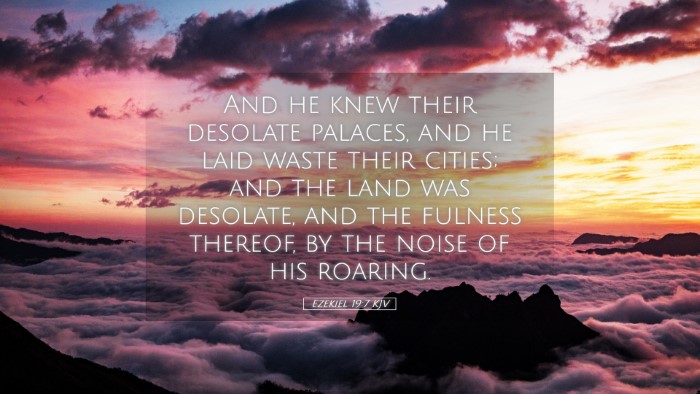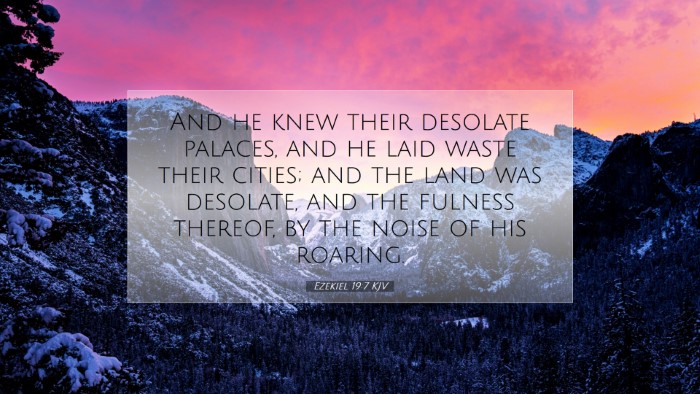Commentary on Ezekiel 19:7
Ezekiel 19:7 is a poignant verse that encapsulates themes of strength, vulnerability, and prophetic warning prominent throughout the book of Ezekiel. In this commentary, we will explore a range of insights drawn from esteemed public domain commentaries, providing depth and clarity that will be valuable for pastors, students, theologians, and Bible scholars.
Verse Context
Ezekiel 19:7 states: “And he knew their desolate places, and laid waste their cities; and the land was desolate, and the fullness thereof, by the noise of his roaring.” This verse is situated within a lament for the princes of Israel, symbolized by a lion and her cubs, pointing to the tragedy of lost leadership in Israel. The imagery evokes a sense of devastation resulting from the failings of these leaders.
Insights from Matthew Henry
Matthew Henry's commentary emphasizes the metaphorical significance of the lion and its cubs, interpreting them as representations of Israel's influential leaders, particularly during the period of collapse and exile. He outlines several key observations:
- The Lion as Leadership: Henry identifies the lion as a symbol of strength and courage, reflecting on how Israel's leaders were expected to embody these qualities. Their failures, however, led to devastating consequences for the nation.
- Desolation of the Land: The verse conveys a stark picture of desolation resulting from the neglect and moral decay of these leaders. Henry asserts that the lash of judgment is aimed not merely at institutions but at the moral failures of individuals in power.
- Symbol of Judgment: According to Henry, the roaring of the lion signifies the impending judgment upon Israel, a theme that resonates throughout Ezekiel’s prophecies. The roar can be interpreted as a warning, drawing attention to the seriousness of their plight.
Insights from Albert Barnes
Albert Barnes offers a detailed exegesis of the verse, illustrating how the metaphor illustrates a broader spiritual truth. His insights include:
- National Consequences: Barnes highlights the connection between leadership and national destiny. The fall of the 'lion' symbolizes the broader consequences of leadership failures on the nation as a whole.
- Historical Fulfillment: He draws parallels between the historical context of the Babylonian exile and this lament, emphasizing how the leaders’ actions precipitated such calamities.
- Call for Reflection: Barnes urges contemporary readers to reflect on their own leadership and its impact, suggesting that this verse serves as both a historical account and a cautionary tale for future generations.
Insights from Adam Clarke
Adam Clarke provides an in-depth theological analysis of the scripture, focusing on the implications of desolation and its causes. Key themes from Clarke include:
- Spiritual Desolation: Clarke emphasizes that the physical desolation of the land is a direct result of spiritual decay among its leaders. He posits that true leadership must be rooted in spirituality and righteousness.
- God's Sovereignty: He asserts that, despite the dire circumstances depicted, God's sovereignty remains intact. This perspective invites readers to consider how God's purposes are fulfilled even through human failures.
- Prophetic Purpose: Clarke highlights the dual role of Ezekiel as both a prophet and a pastor, calling for both lamentation over the loss and a call to repentance and restoration.
Theological Implications
The theological implications drawn from Ezekiel 19:7 reflect the critical importance of leadership grounded in God's principles. Each commentary underscores the necessity for leaders—whether in spiritual, secular, or communal contexts—to exhibit qualities reflecting divine justice, mercy, and righteousness. The desolation that follows a neglect of these principles serves as a stark warning for churches, communities, and nations today.
Application for Today
In light of Ezekiel 19:7, there are several applications for contemporary readers:
- Leadership Accountability: There is a pressing need for accountability among leaders, reminding them that their actions resonate beyond their immediate circles.
- Community Reflection: Communities should reflect on their own spiritual health and leadership practices, drawing lessons from the lamentations found in Ezekiel.
- Encouragement to Spiritual Growth: The passage encourages individuals and congregations to pursue spiritual growth actively, ensuring that their community is reflective of godly principles.
Conclusion
In summary, Ezekiel 19:7 is a rich text that offers profound insights into leadership, accountability, and divine judgment. The synthesis of perspectives from Matthew Henry, Albert Barnes, and Adam Clarke reveals timeless truths that are relevant for Christians in every era. As we contemplate this verse, may we be moved toward deeper introspection, renewed commitment to rightful leadership, and an understanding of the seriousness of our collective spiritual journey.


